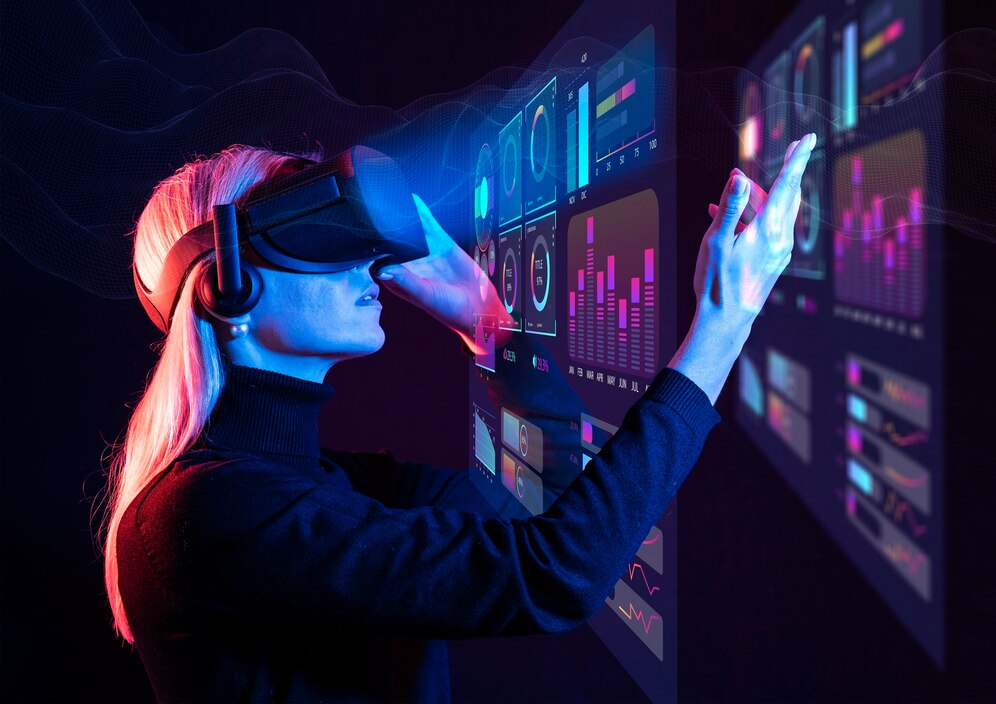By Maria Papagiannopoulou,
Virtual Reality (VR), once relegated to the realm of gaming, has transcended its initial boundaries to become a transformative force across diverse industries. Beyond the immersive gaming experiences that first brought VR into the spotlight, this technology is now proving to be a powerful tool with applications ranging from healthcare to education and beyond. In this article, we embark on a journey to explore the expansive horizons of virtual reality and its applications beyond the gaming world.
Virtual Reality has emerged as a game-changer in healthcare, offering innovative solutions for medical training, therapy, and patient care. Surgeons can now practice complex procedures in a risk-free virtual environment, enhancing their skills and reducing the margin of error. VR is also employed in patient therapy, providing immersive environments for pain management, stress reduction, and mental health treatment.
The traditional classroom is undergoing a transformation with the integration of virtual reality. From virtual field trips to historical events to hands-on scientific experiments, educators are leveraging VR to make learning more engaging and interactive. In the professional realm, VR is being used for employee training, enabling simulations that replicate real-world scenarios in fields such as aviation, manufacturing, and emergency response.

Architects and designers are utilizing VR to revolutionize their creative processes. Virtual reality allows professionals to step into a three-dimensional representation of their designs, providing a more intuitive understanding of space, scale, and aesthetics. This immersive experience facilitates better collaboration among team members and enhances client communication.
Virtual reality is transforming the way properties are showcased and sold. Potential buyers can take virtual tours of homes and commercial spaces from the comfort of their locations, providing a more realistic and immersive preview than traditional photographs. This application is particularly valuable for international buyers or those unable to physically visit a property.
Industries such as military, aviation, and first responders are employing VR to simulate high-risk environments for training purposes. This enables personnel to practice and refine their skills in realistic scenarios without exposing themselves to actual danger. VR simulations contribute to better-prepared professionals and improved safety measures.
Virtual reality is playing a crucial role in preserving and sharing cultural heritage. VR applications allow users to explore historical sites, museums, and artifacts in a virtual space. This not only opens up new avenues for education but also ensures that cultural treasures are accessible to a global audience, contributing to their preservation.
VR is increasingly used in therapeutic settings to treat various mental health conditions, including phobias, PTSD, and anxiety disorders. Exposure therapy in virtual environments provides a controlled and customizable way for individuals to confront and overcome their fears or traumas.
In the era of remote work, virtual reality offers a unique solution for enhancing collaboration and communication. Virtual meeting spaces and collaborative environments enable teams to work together seamlessly, fostering a sense of presence and connection that traditional video conferencing may lack.
The journey of virtual reality beyond gaming is a testament to the technology’s versatility and transformative potential. From revolutionizing healthcare practices to enhancing educational experiences and reshaping industries, VR has firmly established itself as a multidimensional tool with the capacity to redefine how we work, learn, and interact in the 21st century. As advancements in virtual reality continue, the possibilities for its applications seem boundless, promising a future where immersive experiences extend far beyond the confines of a gaming console.
References
- virtual reality gaming (VR gaming). Techtarget. Available here
- Anderson C. A. “An update on the effects of playing violent video games”. Journal of Adolescence. 27(1). pg 113-122.




